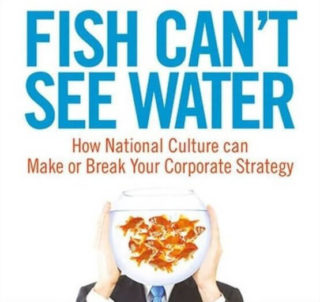Kai Hemmerich and Richard Lewis’s new book, Fish Can’t See Water, serves as the counter argument to Thomas Friedman’s The World is Flat.
Delving into the successes and failures of various multinationals, the authors argue that even in our highly-globalised world, country differences still matter immensely, and how businesses approach those differences, be it within their customer approach or within the company structure itself, can make or break an organisation.
In a special plug for the book, Lewis said of its title: “If you think of fish in a globe, they can see things outside the globe, but they can’t see the water.
“It’s like that with culture. When we are living in our own culture, we don’t see the elements about it that other people might.”
The book offers a number of examples of large companies that have both succeeded and failed in foreign markets. One of those failures is Walmart’s venture into the German market in the late 1990s an expansion strategy that, on paper, made perfect sense.
Despite being a rich market, retailing in Germany was very underdeveloped. Walmart was a large, incredibly wealthy company with unrivalled success in the United States. However, when the America retail giant bought out two German chains and opened its first shops in Germany, it insisted on doing things the “Walmart way”. This included greeters at the door telling customers to “Have a nice day,” and strict instructions to always, always, smile.
German shoppers couldn’t stand it and as a result, Walmart lost an average $150 million per year from its eight-year venture in the German market, which came to an end in 2006.
Fish Can’t See Water also boldly delves into how certain cultural characteristics, their national essence, have had an adverse effect on companies – a factor that many critics site as an oversimplification of culture on behalf of the authors, leading to the books unfortunate shortcoming.
Hemmerich and Lewis argue that Nokia’s rapid rise and subsequent descent were rooted in the characteristics of the Finnish psyche. When Nokia led the still very young mobile phone market, it was down to the company’s “hard work, honesty, sticking together to overcome adversity, and fact-orientation over emotions”.
However, as the market evolved, the authors write that Nokia fell victim to a “national tendency for introspection” and “reluctance to engage emotionally,” which detached it from the customer base.
While there might be a kernel of truth in such analyses, critics cite that the book overplays the role of cultural identity within business, neglecting obvious economic and political factors.
Culture in business matters, and no company should be foolish enough to introduce its products into a new market without trying to understand its culture. However, generally classifying cultures as if it were a form of science, as Fish Can’t See Water attempts to do, is perhaps a step too far, and one which might lead to a series of falsehoods and an overreliance on clichés.
Today Translations is a professional translation, interpreting and localisation company, which also offers specialist briefing and consultation services for companies looking to tap into new markets.
If you’d like to find out more about how we can help you and your organisation, contact us on + (0)207 397 2770 or email us at [email protected]

